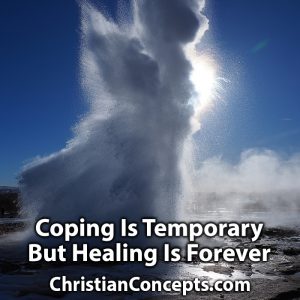Reading time: 3 minutes
The recipe for deep depression is a combination of pain and hopelessness. Without pain, hopelessness has no teeth. Suffering becomes avoidable. With hope, pain can be endured. Here also suffering becomes avoidable. A person can’t be joyful without hope.
Isolation Increases Depression
David describes the potential for his depression as involving not hearing from God. In Psalm 28, he uses “pit” as a place of utter despair.
To you, O Lord, I call;
Psalm 28:1 ESV
my rock, be not deaf to me,
lest, if you be silent to me,
I become like those who go down to the pit.
The bottom of a pit is a lonely place. It is easy to feel forgotten. Despair increases when circumstances are hopeless. It’s easy to self-harm when discouragement dominates. In this context, self-harm means believing increasingly negative thoughts such as:
- I’ll never get out of this (pit).
- I’m not worth saving.
- God has me here for a reason and that reason is He is against me.
- God has abandoned me.
- I’m a terrible person.
This kind of thinking only makes a bad situation (potentially avoidable) worse (appearing unavoidable).
Sometimes God will improve circumstances relatively quickly. Maybe you lose your job, but find one within a couple of weeks. Perhaps you find yourself in and out of trouble before you have time to worry. God is gracious and merciful. He preserves and protects those He loves from danger–both deserved and undeserved consequences.
Such mercy is normal in the sense that God prevents us from receiving what we deserve. He is constantly doing this. Jesus is never not interceding on our behalf before God. If He wasn’t, every moment of our lives would be full of despair. Yet, in another sense, life can be full of heartache. Everyone is suffering on some level.
Some suffering is avoidable while another suffering is unavoidable. Suffering has a purpose; depression is one response to it, but there is another.
Connection Reverses Depression
If depression intensifies with pain and despair, then the absence of pain and the presence of hope would certainly alleviate sadness. How do we get from one to the other? How can someone climb out of a pit? Sometimes God might teleport you to the surface, but quite often He rather chooses a more organic process: grief.
Having someone hear your cry is the path out of depression.
I waited patiently for the Lord;
Psalm 40:1-3 ESV
he inclined to me and heard my cry.
He drew me up from the pit of destruction,
out of the miry bog,
and set my feet upon a rock,
making my steps secure.
He put a new song in my mouth,
a song of praise to our God.
Many will see and fear,
and put their trust in the Lord.
And, what is grief, but crying out to someone who will listen? Grief is an expression of pain in the midst of hope. The way out is rarely painless, but it must be full of hope. Without hope, an attempt to grieve will only dig the pit of despair deeper. Sadness begets more sadness. That’s why sometimes focusing on the positives helps. While it can help, it doesn’t fully address the real problem of suffering.
Grief is more a struggle than it is suffering. It’s a struggle forward or up out of avoidable suffering. When you declare your circumstances as unacceptable, you leave no room for patiently waiting on the Lord. Grieving reorients your perspective until you find acceptance.
When you are grieving, you are moving up out of the pit. Your direction is toward God, toward joy. When you are despairing, you are moving deeper down in the pit. Your direction is away from the light and toward the darkness.
Your direction is more important than your exact location especially when you know you have God’s ear. The next time you are depressed, express your suffering to God and He will lift you out of the pit. If you need help with this, consider professional Christian counseling.
Read more about healthy grieving.
Image by 173131 from Pixabay






